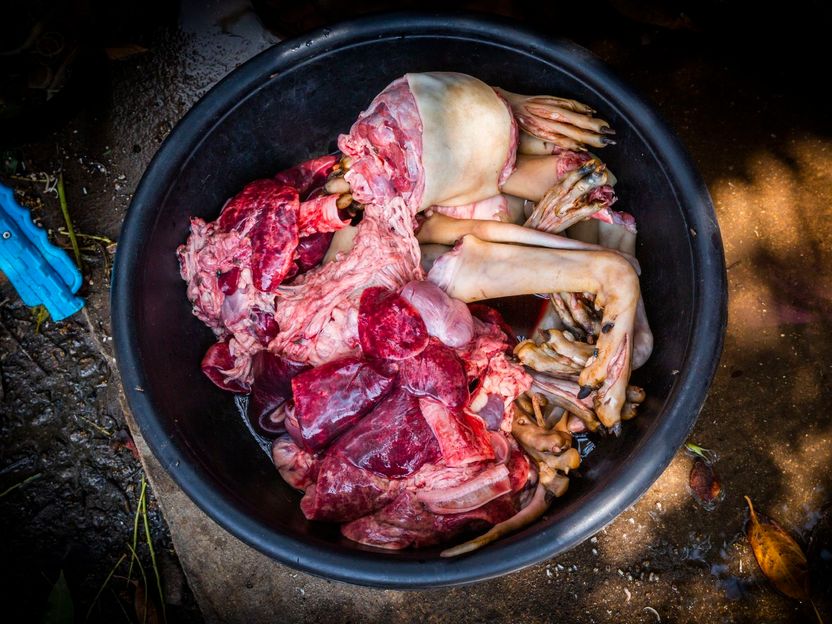China bans the sale of dog and cat meat
Slaughterhouses and live animal markets: ticking time bombs
Advertisement
A historic moment for animal welfare: China published, on 29.5. a new national catalogue of farm animals, which explicitly excludes dogs. Thus the sale of live dogs and dog meat for consumption is forbidden in China. cats were never part of the livestock catalogue. FOUR PAWS welcomes China's initiative and calls on the governments in Cambodia, Vietnam and Indonesia to catch up with China. The dog and cat meat trade is not only a huge animal welfare problem in Southeast Asia, but also poses a major risk to public health. After all, the unhygienic conditions under which animals are caught, kept, slaughtered and sold - mostly in live animal markets - are the perfect breeding ground for new zoonotic viruses.

VIER PFOTEN – Stiftung für Tierschutz
In Vietnam - China's neighbour - around five million dogs and one million cats are still caught and brutally slaughtered for their meat every year. The animals are often transported across borders to China. With an estimated four million domestic and stray animals killed each year, the situation in Cambodia and Indonesia is similarly devastating. "Of course, it is a positive signal that China is banning the sale of dog and cat meat, even though this decision probably has nothing to do with love of animals, but rather with food safety. But now Vietnam, Cambodia and Indonesia must also act. In addition to unbelievable animal suffering, the trade in dog and cat meat is also responsible for outbreaks of diseases such as rabies and cholera. And as we now know, the whole world can suffer from the deadly zoonotic viruses that are generated in the unhygienic live animal markets where dog and cat meat is partly sold
," says Dr. Katherine Polak, veterinarian and head of the FOUR PAWS Stray Animal Care in Southeast Asia.
Slaughterhouses and live animal markets: ticking time bombs
The injured and traumatized dogs and cats - including stolen pets - are crammed into cramped cages and transported for hours to slaughterhouses and markets in Southeast Asia in enormous heat and without water. The piled up cages, the weakened immune system of the dogs and cats and the unnatural contact with wild animals, which are also slaughtered, create the perfect breeding ground for deadly zoonotic viruses, such as the new coronavirus. "The rampant dog and cat meat trade and live animal markets throughout South East Asia are ticking time bombs. If governments don't stop this brutal trade now and close down the cruel markets and slaughterhouses, the next global pandemic could originate in Vietnam, Cambodia or Indonesia," said Dr Polak.
VIER PFOTEN: Fight against the dog and cat meat trade
In order to bring a sustainable end to the brutal trade in dog and cat meat in Southeast Asia, FOUR PAWS has launched a campaign on an international and national level. "Through educational work and cooperation with the responsible authorities and tourism associations, governments are to be persuaded to introduce strict animal welfare laws that prohibit the catching, slaughtering and eating of dogs and cats," explains Dr. Karanvir Kukreja, project manager of the FOUR PAWS campaign. FOUR PAWS also supports local animal welfare organisations and communities with humane and sustainable programmes for the management of the dog and cat population. FOUR PAWS is also part of the animal welfare coalitions DMFI (Dog Meat Free Indonesia) and ACPA (Asia Canine Protection Alliance), which lobby against trade in Southeast Asia.
FOUR PAWS has also started a petition against the dog and cat meat trade, which has already been signed by more than 750,000 supporters worldwide.
Note: This article has been translated using a computer system without human intervention. LUMITOS offers these automatic translations to present a wider range of current news. Since this article has been translated with automatic translation, it is possible that it contains errors in vocabulary, syntax or grammar. The original article in German can be found here.
Other news from the department business & finance
Most read news
More news from our other portals
See the theme worlds for related content
Topic world Food safety
Food safety is at the heart of the food and beverage industry. It ensures that the food we eat every day is not only nutritious, but also free of harmful contaminants. From field to plate, the industry monitors and regulates every step of the process with strict quality controls, advanced testing methods and continuous research.

Topic world Food safety
Food safety is at the heart of the food and beverage industry. It ensures that the food we eat every day is not only nutritious, but also free of harmful contaminants. From field to plate, the industry monitors and regulates every step of the process with strict quality controls, advanced testing methods and continuous research.




























































